Sustainable and Responsible Tourism Management in Slovenia Report
VerifiedAdded on 2023/01/04
|15
|4731
|170
Report
AI Summary
This report delves into the concept of sustainable and responsible tourism, using Slovenia as a case study. It begins with an introduction to sustainability and its growing importance, particularly in the tourism sector. The report then explores the evolution of sustainable tourism since the 1980s, highlighting Slovenia's achievements in this area, including its recognition as a leading sustainable destination. It examines the roles of global organizations like UNWTO and WTTC in promoting sustainable tourism. The report further analyzes the principles of tourism development and planning, emphasizing resource management, waste reduction, biodiversity maintenance, strategic planning, local economic support, staff training, and responsible marketing. It evaluates the process of tourism development and planning in Slovenia, including identifying areas for improvement. The report investigates the economic, social, cultural, and environmental impacts of tourism activities in Slovenia. It also examines how sustainability principles are implemented by specific tourism businesses and the contributions of various stakeholders. Finally, the report evaluates how sustainability is being developed and managed in a range of tourist destinations worldwide, offering a comprehensive overview of sustainable tourism practices and their effectiveness.
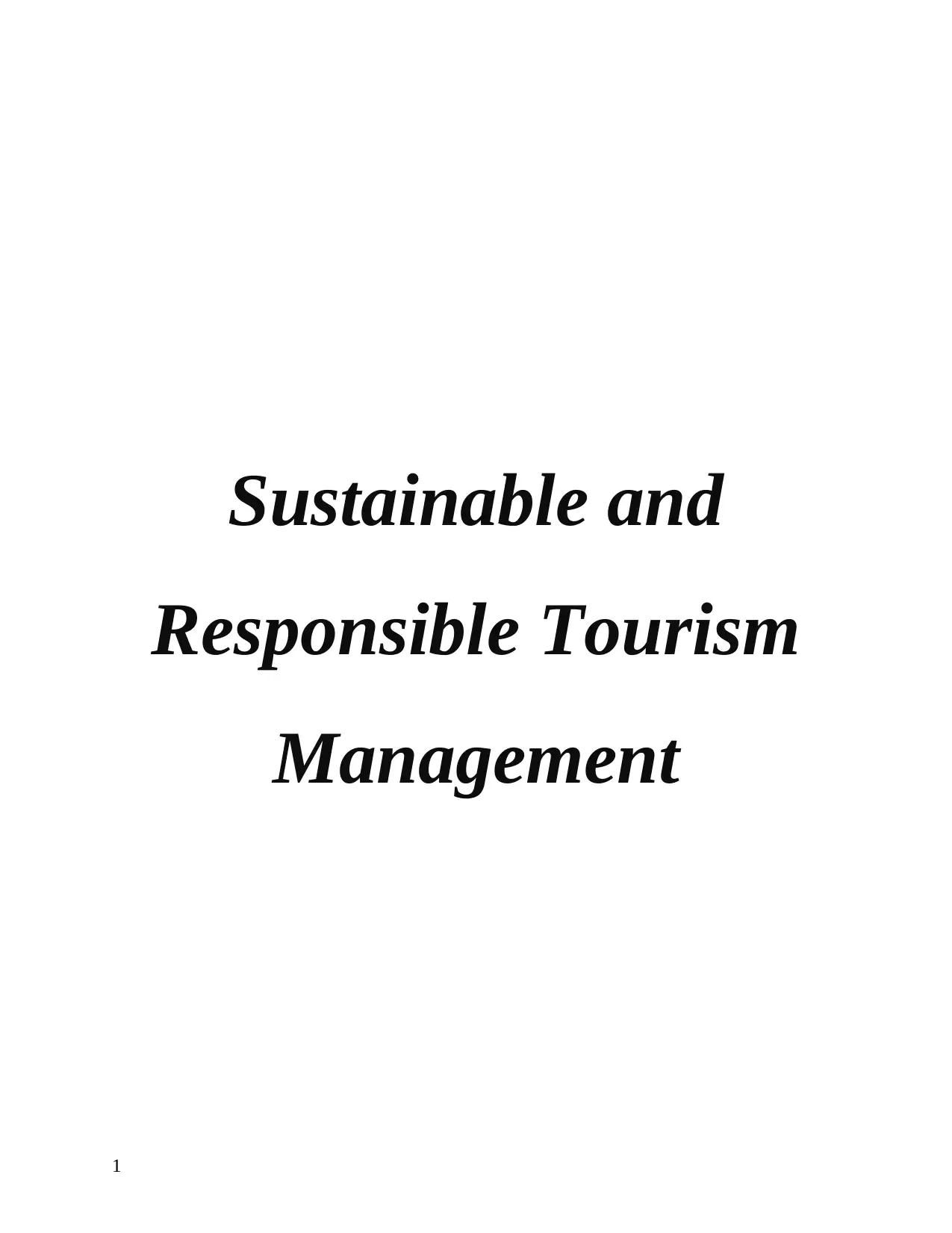
Sustainable and
Responsible Tourism
Management
1
Responsible Tourism
Management
1
Paraphrase This Document
Need a fresh take? Get an instant paraphrase of this document with our AI Paraphraser
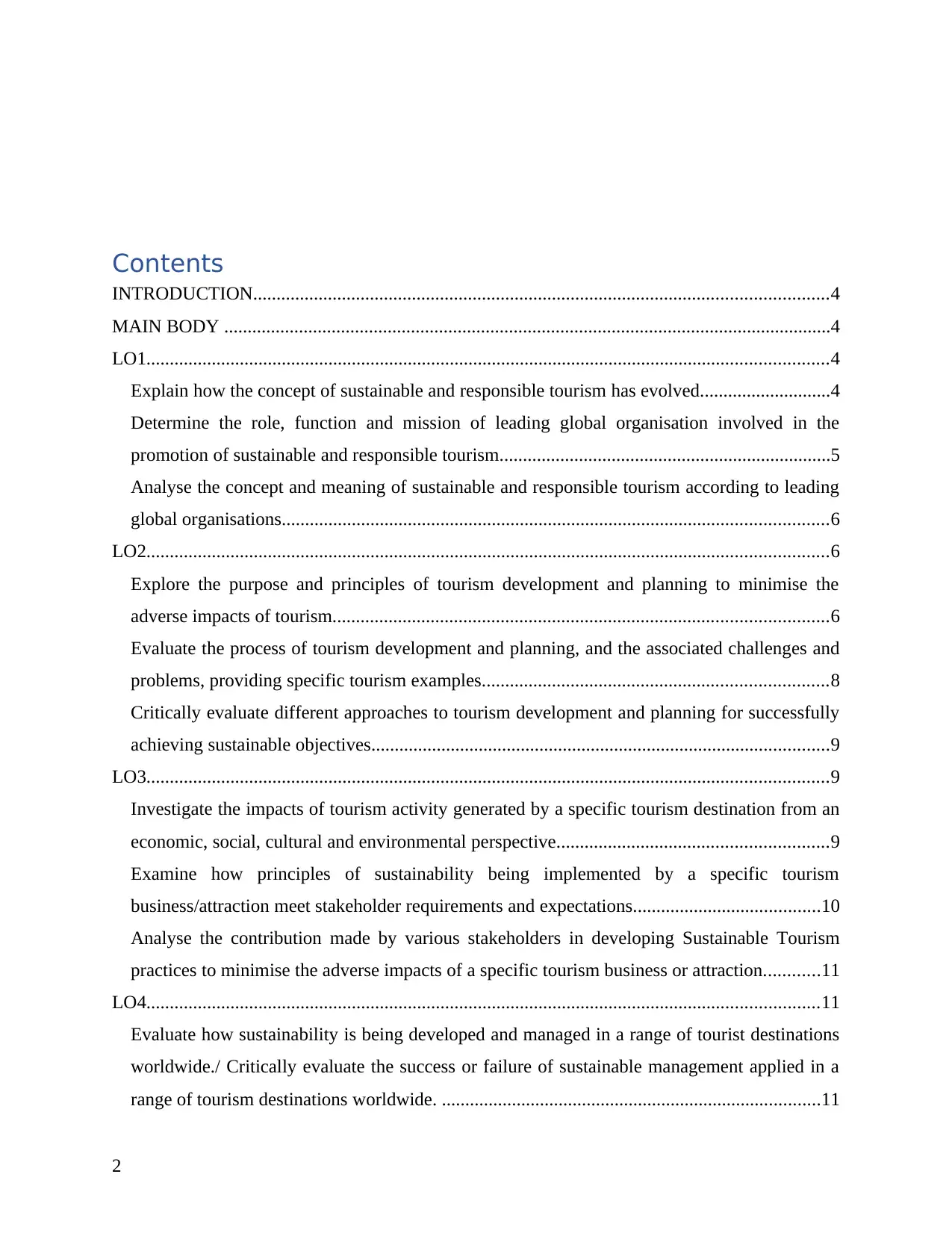
Contents
INTRODUCTION...........................................................................................................................4
MAIN BODY ..................................................................................................................................4
LO1..................................................................................................................................................4
Explain how the concept of sustainable and responsible tourism has evolved............................4
Determine the role, function and mission of leading global organisation involved in the
promotion of sustainable and responsible tourism.......................................................................5
Analyse the concept and meaning of sustainable and responsible tourism according to leading
global organisations.....................................................................................................................6
LO2..................................................................................................................................................6
Explore the purpose and principles of tourism development and planning to minimise the
adverse impacts of tourism..........................................................................................................6
Evaluate the process of tourism development and planning, and the associated challenges and
problems, providing specific tourism examples..........................................................................8
Critically evaluate different approaches to tourism development and planning for successfully
achieving sustainable objectives..................................................................................................9
LO3..................................................................................................................................................9
Investigate the impacts of tourism activity generated by a specific tourism destination from an
economic, social, cultural and environmental perspective..........................................................9
Examine how principles of sustainability being implemented by a specific tourism
business/attraction meet stakeholder requirements and expectations........................................10
Analyse the contribution made by various stakeholders in developing Sustainable Tourism
practices to minimise the adverse impacts of a specific tourism business or attraction............11
LO4................................................................................................................................................11
Evaluate how sustainability is being developed and managed in a range of tourist destinations
worldwide./ Critically evaluate the success or failure of sustainable management applied in a
range of tourism destinations worldwide. .................................................................................11
2
INTRODUCTION...........................................................................................................................4
MAIN BODY ..................................................................................................................................4
LO1..................................................................................................................................................4
Explain how the concept of sustainable and responsible tourism has evolved............................4
Determine the role, function and mission of leading global organisation involved in the
promotion of sustainable and responsible tourism.......................................................................5
Analyse the concept and meaning of sustainable and responsible tourism according to leading
global organisations.....................................................................................................................6
LO2..................................................................................................................................................6
Explore the purpose and principles of tourism development and planning to minimise the
adverse impacts of tourism..........................................................................................................6
Evaluate the process of tourism development and planning, and the associated challenges and
problems, providing specific tourism examples..........................................................................8
Critically evaluate different approaches to tourism development and planning for successfully
achieving sustainable objectives..................................................................................................9
LO3..................................................................................................................................................9
Investigate the impacts of tourism activity generated by a specific tourism destination from an
economic, social, cultural and environmental perspective..........................................................9
Examine how principles of sustainability being implemented by a specific tourism
business/attraction meet stakeholder requirements and expectations........................................10
Analyse the contribution made by various stakeholders in developing Sustainable Tourism
practices to minimise the adverse impacts of a specific tourism business or attraction............11
LO4................................................................................................................................................11
Evaluate how sustainability is being developed and managed in a range of tourist destinations
worldwide./ Critically evaluate the success or failure of sustainable management applied in a
range of tourism destinations worldwide. .................................................................................11
2

CONCLUSION..............................................................................................................................13
REFERENCES..............................................................................................................................14
3
REFERENCES..............................................................................................................................14
3
⊘ This is a preview!⊘
Do you want full access?
Subscribe today to unlock all pages.

Trusted by 1+ million students worldwide
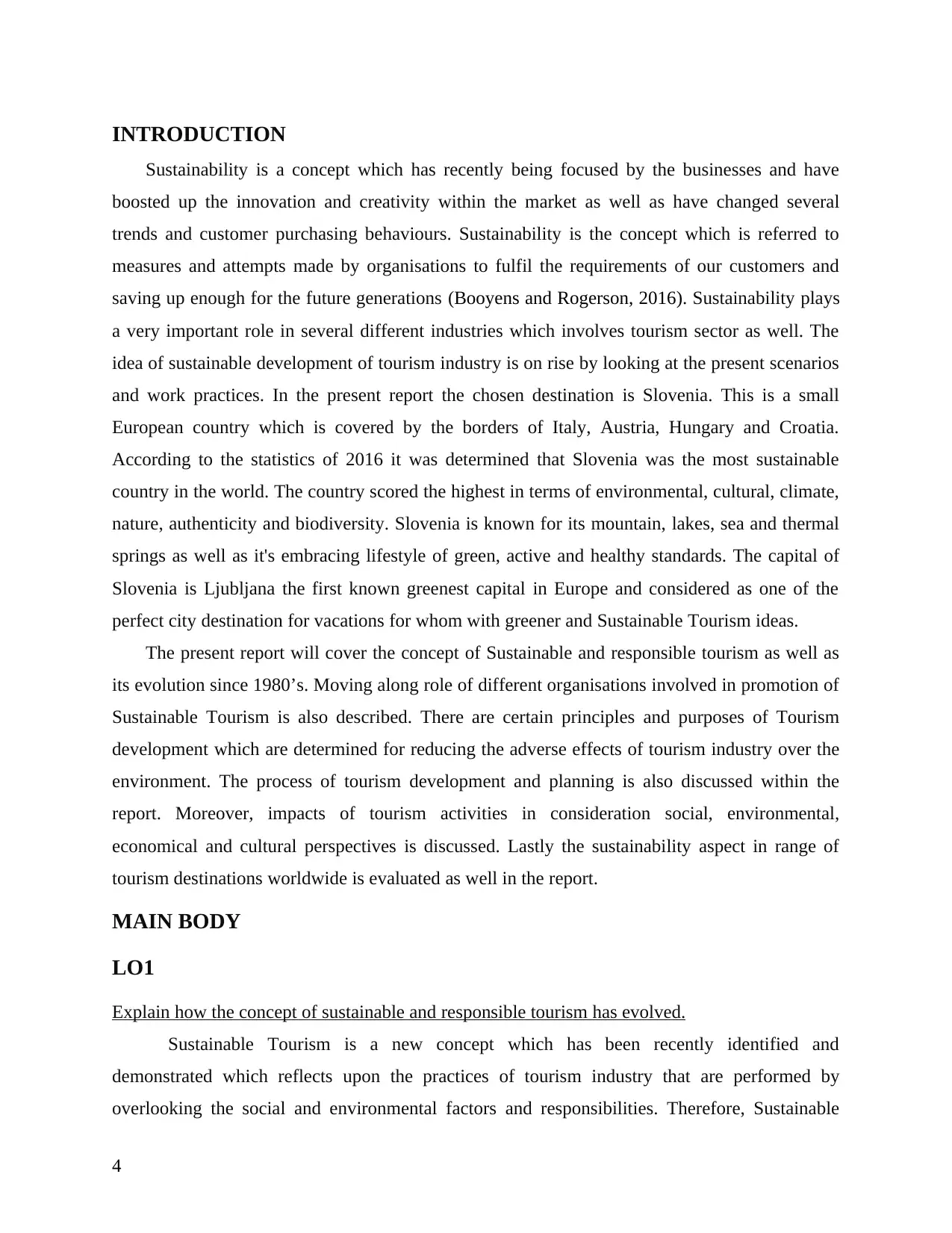
INTRODUCTION
Sustainability is a concept which has recently being focused by the businesses and have
boosted up the innovation and creativity within the market as well as have changed several
trends and customer purchasing behaviours. Sustainability is the concept which is referred to
measures and attempts made by organisations to fulfil the requirements of our customers and
saving up enough for the future generations (Booyens and Rogerson, 2016). Sustainability plays
a very important role in several different industries which involves tourism sector as well. The
idea of sustainable development of tourism industry is on rise by looking at the present scenarios
and work practices. In the present report the chosen destination is Slovenia. This is a small
European country which is covered by the borders of Italy, Austria, Hungary and Croatia.
According to the statistics of 2016 it was determined that Slovenia was the most sustainable
country in the world. The country scored the highest in terms of environmental, cultural, climate,
nature, authenticity and biodiversity. Slovenia is known for its mountain, lakes, sea and thermal
springs as well as it's embracing lifestyle of green, active and healthy standards. The capital of
Slovenia is Ljubljana the first known greenest capital in Europe and considered as one of the
perfect city destination for vacations for whom with greener and Sustainable Tourism ideas.
The present report will cover the concept of Sustainable and responsible tourism as well as
its evolution since 1980’s. Moving along role of different organisations involved in promotion of
Sustainable Tourism is also described. There are certain principles and purposes of Tourism
development which are determined for reducing the adverse effects of tourism industry over the
environment. The process of tourism development and planning is also discussed within the
report. Moreover, impacts of tourism activities in consideration social, environmental,
economical and cultural perspectives is discussed. Lastly the sustainability aspect in range of
tourism destinations worldwide is evaluated as well in the report.
MAIN BODY
LO1
Explain how the concept of sustainable and responsible tourism has evolved.
Sustainable Tourism is a new concept which has been recently identified and
demonstrated which reflects upon the practices of tourism industry that are performed by
overlooking the social and environmental factors and responsibilities. Therefore, Sustainable
4
Sustainability is a concept which has recently being focused by the businesses and have
boosted up the innovation and creativity within the market as well as have changed several
trends and customer purchasing behaviours. Sustainability is the concept which is referred to
measures and attempts made by organisations to fulfil the requirements of our customers and
saving up enough for the future generations (Booyens and Rogerson, 2016). Sustainability plays
a very important role in several different industries which involves tourism sector as well. The
idea of sustainable development of tourism industry is on rise by looking at the present scenarios
and work practices. In the present report the chosen destination is Slovenia. This is a small
European country which is covered by the borders of Italy, Austria, Hungary and Croatia.
According to the statistics of 2016 it was determined that Slovenia was the most sustainable
country in the world. The country scored the highest in terms of environmental, cultural, climate,
nature, authenticity and biodiversity. Slovenia is known for its mountain, lakes, sea and thermal
springs as well as it's embracing lifestyle of green, active and healthy standards. The capital of
Slovenia is Ljubljana the first known greenest capital in Europe and considered as one of the
perfect city destination for vacations for whom with greener and Sustainable Tourism ideas.
The present report will cover the concept of Sustainable and responsible tourism as well as
its evolution since 1980’s. Moving along role of different organisations involved in promotion of
Sustainable Tourism is also described. There are certain principles and purposes of Tourism
development which are determined for reducing the adverse effects of tourism industry over the
environment. The process of tourism development and planning is also discussed within the
report. Moreover, impacts of tourism activities in consideration social, environmental,
economical and cultural perspectives is discussed. Lastly the sustainability aspect in range of
tourism destinations worldwide is evaluated as well in the report.
MAIN BODY
LO1
Explain how the concept of sustainable and responsible tourism has evolved.
Sustainable Tourism is a new concept which has been recently identified and
demonstrated which reflects upon the practices of tourism industry that are performed by
overlooking the social and environmental factors and responsibilities. Therefore, Sustainable
4
Paraphrase This Document
Need a fresh take? Get an instant paraphrase of this document with our AI Paraphraser
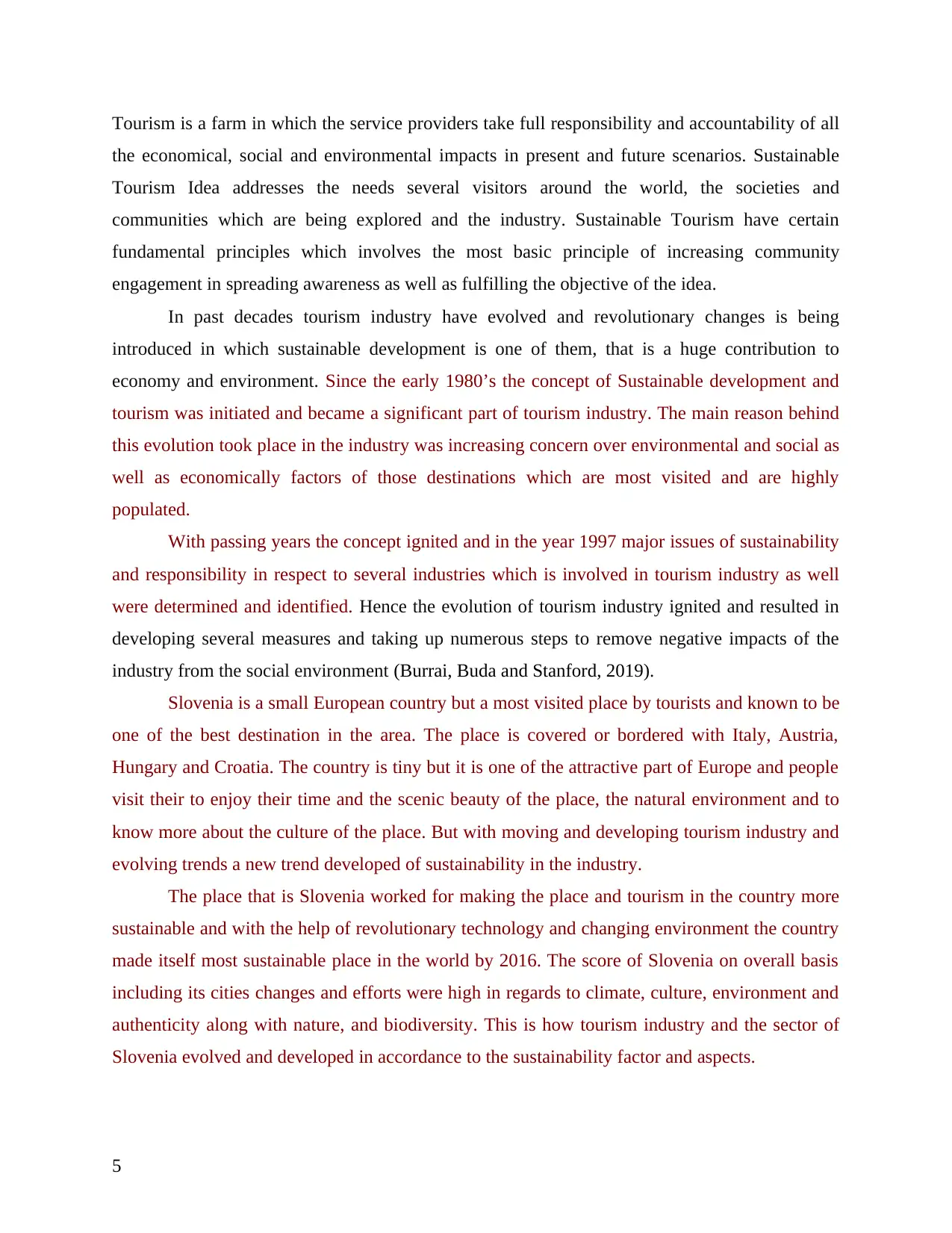
Tourism is a farm in which the service providers take full responsibility and accountability of all
the economical, social and environmental impacts in present and future scenarios. Sustainable
Tourism Idea addresses the needs several visitors around the world, the societies and
communities which are being explored and the industry. Sustainable Tourism have certain
fundamental principles which involves the most basic principle of increasing community
engagement in spreading awareness as well as fulfilling the objective of the idea.
In past decades tourism industry have evolved and revolutionary changes is being
introduced in which sustainable development is one of them, that is a huge contribution to
economy and environment. Since the early 1980’s the concept of Sustainable development and
tourism was initiated and became a significant part of tourism industry. The main reason behind
this evolution took place in the industry was increasing concern over environmental and social as
well as economically factors of those destinations which are most visited and are highly
populated.
With passing years the concept ignited and in the year 1997 major issues of sustainability
and responsibility in respect to several industries which is involved in tourism industry as well
were determined and identified. Hence the evolution of tourism industry ignited and resulted in
developing several measures and taking up numerous steps to remove negative impacts of the
industry from the social environment (Burrai, Buda and Stanford, 2019).
Slovenia is a small European country but a most visited place by tourists and known to be
one of the best destination in the area. The place is covered or bordered with Italy, Austria,
Hungary and Croatia. The country is tiny but it is one of the attractive part of Europe and people
visit their to enjoy their time and the scenic beauty of the place, the natural environment and to
know more about the culture of the place. But with moving and developing tourism industry and
evolving trends a new trend developed of sustainability in the industry.
The place that is Slovenia worked for making the place and tourism in the country more
sustainable and with the help of revolutionary technology and changing environment the country
made itself most sustainable place in the world by 2016. The score of Slovenia on overall basis
including its cities changes and efforts were high in regards to climate, culture, environment and
authenticity along with nature, and biodiversity. This is how tourism industry and the sector of
Slovenia evolved and developed in accordance to the sustainability factor and aspects.
5
the economical, social and environmental impacts in present and future scenarios. Sustainable
Tourism Idea addresses the needs several visitors around the world, the societies and
communities which are being explored and the industry. Sustainable Tourism have certain
fundamental principles which involves the most basic principle of increasing community
engagement in spreading awareness as well as fulfilling the objective of the idea.
In past decades tourism industry have evolved and revolutionary changes is being
introduced in which sustainable development is one of them, that is a huge contribution to
economy and environment. Since the early 1980’s the concept of Sustainable development and
tourism was initiated and became a significant part of tourism industry. The main reason behind
this evolution took place in the industry was increasing concern over environmental and social as
well as economically factors of those destinations which are most visited and are highly
populated.
With passing years the concept ignited and in the year 1997 major issues of sustainability
and responsibility in respect to several industries which is involved in tourism industry as well
were determined and identified. Hence the evolution of tourism industry ignited and resulted in
developing several measures and taking up numerous steps to remove negative impacts of the
industry from the social environment (Burrai, Buda and Stanford, 2019).
Slovenia is a small European country but a most visited place by tourists and known to be
one of the best destination in the area. The place is covered or bordered with Italy, Austria,
Hungary and Croatia. The country is tiny but it is one of the attractive part of Europe and people
visit their to enjoy their time and the scenic beauty of the place, the natural environment and to
know more about the culture of the place. But with moving and developing tourism industry and
evolving trends a new trend developed of sustainability in the industry.
The place that is Slovenia worked for making the place and tourism in the country more
sustainable and with the help of revolutionary technology and changing environment the country
made itself most sustainable place in the world by 2016. The score of Slovenia on overall basis
including its cities changes and efforts were high in regards to climate, culture, environment and
authenticity along with nature, and biodiversity. This is how tourism industry and the sector of
Slovenia evolved and developed in accordance to the sustainability factor and aspects.
5
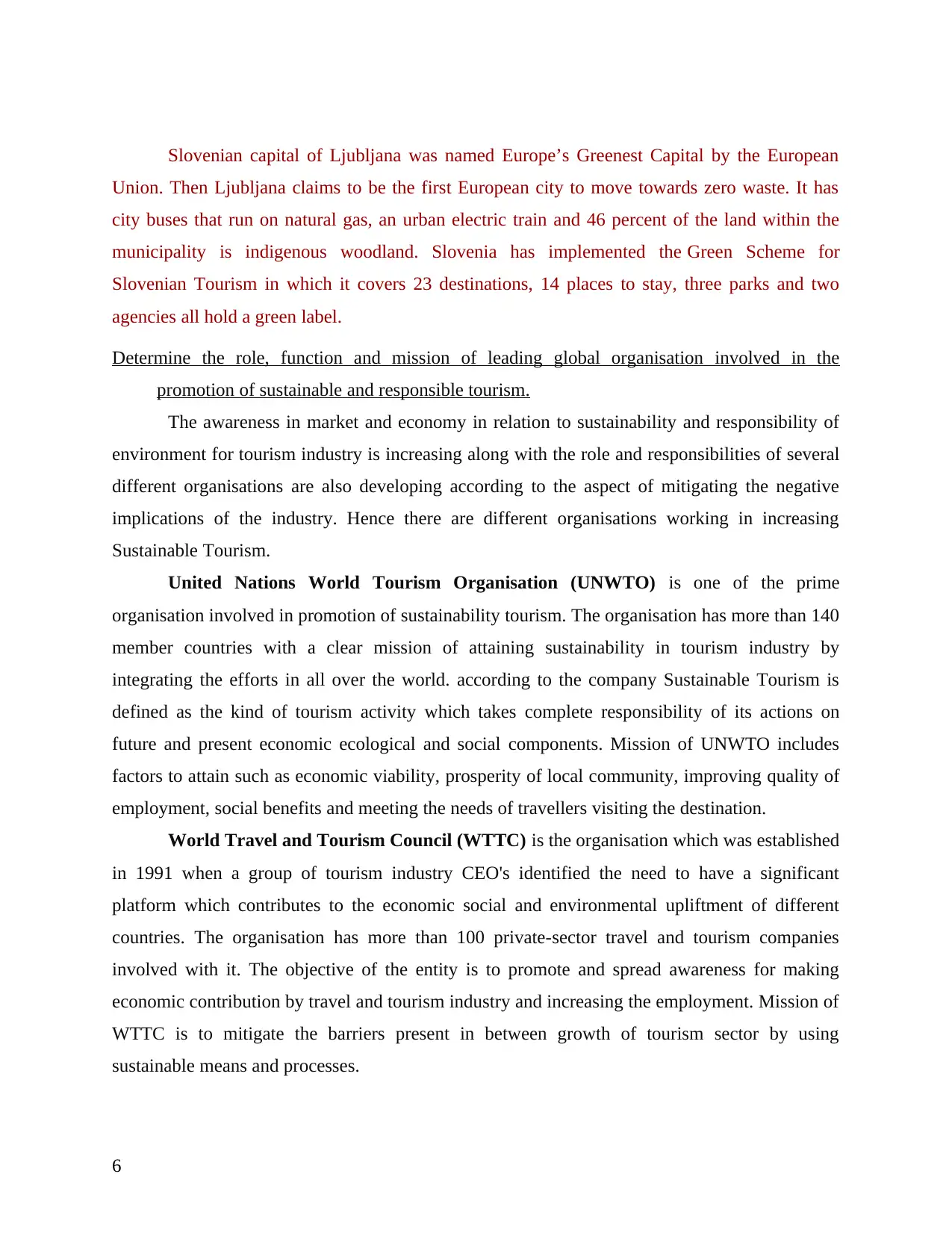
Slovenian capital of Ljubljana was named Europe’s Greenest Capital by the European
Union. Then Ljubljana claims to be the first European city to move towards zero waste. It has
city buses that run on natural gas, an urban electric train and 46 percent of the land within the
municipality is indigenous woodland. Slovenia has implemented the Green Scheme for
Slovenian Tourism in which it covers 23 destinations, 14 places to stay, three parks and two
agencies all hold a green label.
Determine the role, function and mission of leading global organisation involved in the
promotion of sustainable and responsible tourism.
The awareness in market and economy in relation to sustainability and responsibility of
environment for tourism industry is increasing along with the role and responsibilities of several
different organisations are also developing according to the aspect of mitigating the negative
implications of the industry. Hence there are different organisations working in increasing
Sustainable Tourism.
United Nations World Tourism Organisation (UNWTO) is one of the prime
organisation involved in promotion of sustainability tourism. The organisation has more than 140
member countries with a clear mission of attaining sustainability in tourism industry by
integrating the efforts in all over the world. according to the company Sustainable Tourism is
defined as the kind of tourism activity which takes complete responsibility of its actions on
future and present economic ecological and social components. Mission of UNWTO includes
factors to attain such as economic viability, prosperity of local community, improving quality of
employment, social benefits and meeting the needs of travellers visiting the destination.
World Travel and Tourism Council (WTTC) is the organisation which was established
in 1991 when a group of tourism industry CEO's identified the need to have a significant
platform which contributes to the economic social and environmental upliftment of different
countries. The organisation has more than 100 private-sector travel and tourism companies
involved with it. The objective of the entity is to promote and spread awareness for making
economic contribution by travel and tourism industry and increasing the employment. Mission of
WTTC is to mitigate the barriers present in between growth of tourism sector by using
sustainable means and processes.
6
Union. Then Ljubljana claims to be the first European city to move towards zero waste. It has
city buses that run on natural gas, an urban electric train and 46 percent of the land within the
municipality is indigenous woodland. Slovenia has implemented the Green Scheme for
Slovenian Tourism in which it covers 23 destinations, 14 places to stay, three parks and two
agencies all hold a green label.
Determine the role, function and mission of leading global organisation involved in the
promotion of sustainable and responsible tourism.
The awareness in market and economy in relation to sustainability and responsibility of
environment for tourism industry is increasing along with the role and responsibilities of several
different organisations are also developing according to the aspect of mitigating the negative
implications of the industry. Hence there are different organisations working in increasing
Sustainable Tourism.
United Nations World Tourism Organisation (UNWTO) is one of the prime
organisation involved in promotion of sustainability tourism. The organisation has more than 140
member countries with a clear mission of attaining sustainability in tourism industry by
integrating the efforts in all over the world. according to the company Sustainable Tourism is
defined as the kind of tourism activity which takes complete responsibility of its actions on
future and present economic ecological and social components. Mission of UNWTO includes
factors to attain such as economic viability, prosperity of local community, improving quality of
employment, social benefits and meeting the needs of travellers visiting the destination.
World Travel and Tourism Council (WTTC) is the organisation which was established
in 1991 when a group of tourism industry CEO's identified the need to have a significant
platform which contributes to the economic social and environmental upliftment of different
countries. The organisation has more than 100 private-sector travel and tourism companies
involved with it. The objective of the entity is to promote and spread awareness for making
economic contribution by travel and tourism industry and increasing the employment. Mission of
WTTC is to mitigate the barriers present in between growth of tourism sector by using
sustainable means and processes.
6
⊘ This is a preview!⊘
Do you want full access?
Subscribe today to unlock all pages.

Trusted by 1+ million students worldwide
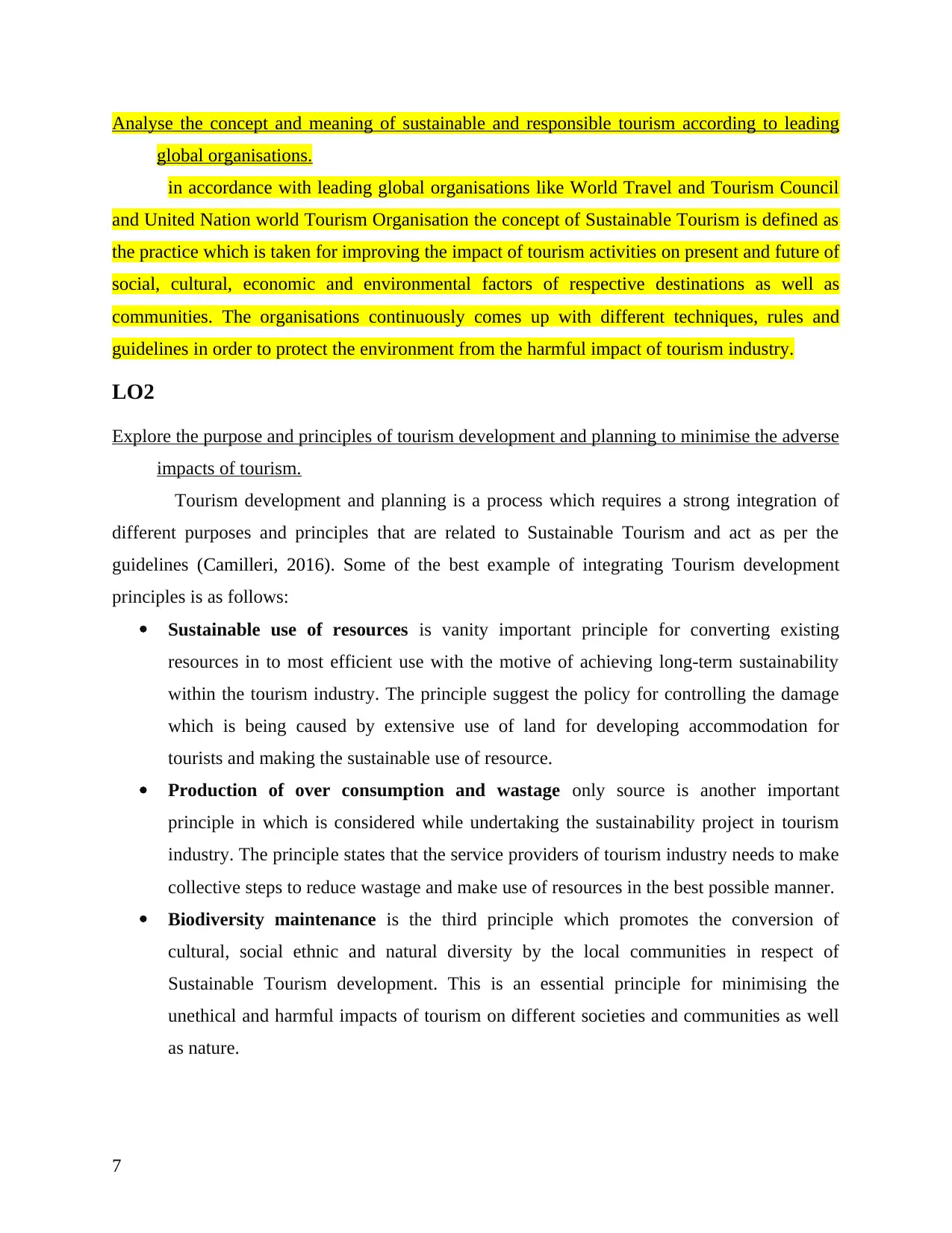
Analyse the concept and meaning of sustainable and responsible tourism according to leading
global organisations.
in accordance with leading global organisations like World Travel and Tourism Council
and United Nation world Tourism Organisation the concept of Sustainable Tourism is defined as
the practice which is taken for improving the impact of tourism activities on present and future of
social, cultural, economic and environmental factors of respective destinations as well as
communities. The organisations continuously comes up with different techniques, rules and
guidelines in order to protect the environment from the harmful impact of tourism industry.
LO2
Explore the purpose and principles of tourism development and planning to minimise the adverse
impacts of tourism.
Tourism development and planning is a process which requires a strong integration of
different purposes and principles that are related to Sustainable Tourism and act as per the
guidelines (Camilleri, 2016). Some of the best example of integrating Tourism development
principles is as follows:
Sustainable use of resources is vanity important principle for converting existing
resources in to most efficient use with the motive of achieving long-term sustainability
within the tourism industry. The principle suggest the policy for controlling the damage
which is being caused by extensive use of land for developing accommodation for
tourists and making the sustainable use of resource.
Production of over consumption and wastage only source is another important
principle in which is considered while undertaking the sustainability project in tourism
industry. The principle states that the service providers of tourism industry needs to make
collective steps to reduce wastage and make use of resources in the best possible manner.
Biodiversity maintenance is the third principle which promotes the conversion of
cultural, social ethnic and natural diversity by the local communities in respect of
Sustainable Tourism development. This is an essential principle for minimising the
unethical and harmful impacts of tourism on different societies and communities as well
as nature.
7
global organisations.
in accordance with leading global organisations like World Travel and Tourism Council
and United Nation world Tourism Organisation the concept of Sustainable Tourism is defined as
the practice which is taken for improving the impact of tourism activities on present and future of
social, cultural, economic and environmental factors of respective destinations as well as
communities. The organisations continuously comes up with different techniques, rules and
guidelines in order to protect the environment from the harmful impact of tourism industry.
LO2
Explore the purpose and principles of tourism development and planning to minimise the adverse
impacts of tourism.
Tourism development and planning is a process which requires a strong integration of
different purposes and principles that are related to Sustainable Tourism and act as per the
guidelines (Camilleri, 2016). Some of the best example of integrating Tourism development
principles is as follows:
Sustainable use of resources is vanity important principle for converting existing
resources in to most efficient use with the motive of achieving long-term sustainability
within the tourism industry. The principle suggest the policy for controlling the damage
which is being caused by extensive use of land for developing accommodation for
tourists and making the sustainable use of resource.
Production of over consumption and wastage only source is another important
principle in which is considered while undertaking the sustainability project in tourism
industry. The principle states that the service providers of tourism industry needs to make
collective steps to reduce wastage and make use of resources in the best possible manner.
Biodiversity maintenance is the third principle which promotes the conversion of
cultural, social ethnic and natural diversity by the local communities in respect of
Sustainable Tourism development. This is an essential principle for minimising the
unethical and harmful impacts of tourism on different societies and communities as well
as nature.
7
Paraphrase This Document
Need a fresh take? Get an instant paraphrase of this document with our AI Paraphraser
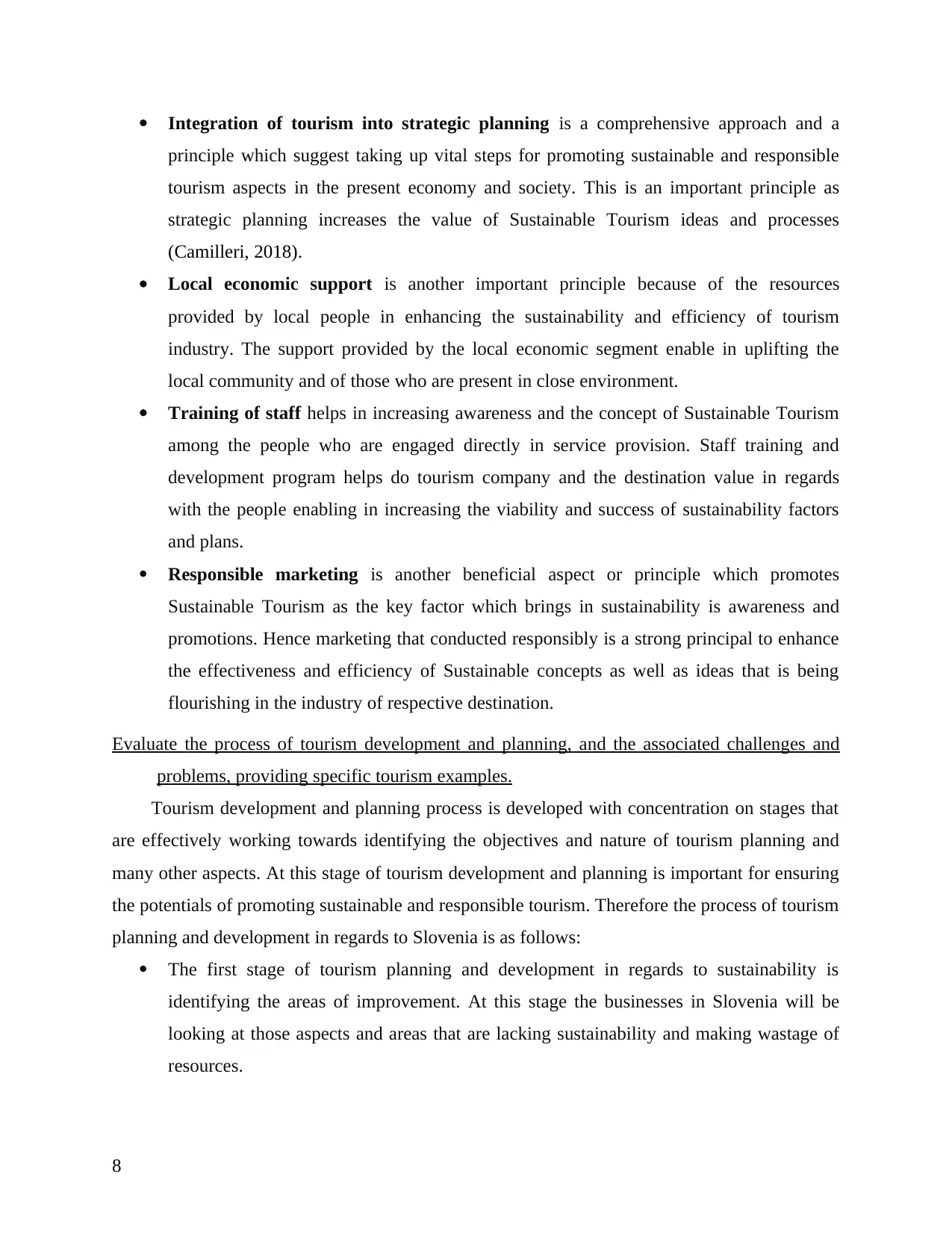
Integration of tourism into strategic planning is a comprehensive approach and a
principle which suggest taking up vital steps for promoting sustainable and responsible
tourism aspects in the present economy and society. This is an important principle as
strategic planning increases the value of Sustainable Tourism ideas and processes
(Camilleri, 2018).
Local economic support is another important principle because of the resources
provided by local people in enhancing the sustainability and efficiency of tourism
industry. The support provided by the local economic segment enable in uplifting the
local community and of those who are present in close environment.
Training of staff helps in increasing awareness and the concept of Sustainable Tourism
among the people who are engaged directly in service provision. Staff training and
development program helps do tourism company and the destination value in regards
with the people enabling in increasing the viability and success of sustainability factors
and plans.
Responsible marketing is another beneficial aspect or principle which promotes
Sustainable Tourism as the key factor which brings in sustainability is awareness and
promotions. Hence marketing that conducted responsibly is a strong principal to enhance
the effectiveness and efficiency of Sustainable concepts as well as ideas that is being
flourishing in the industry of respective destination.
Evaluate the process of tourism development and planning, and the associated challenges and
problems, providing specific tourism examples.
Tourism development and planning process is developed with concentration on stages that
are effectively working towards identifying the objectives and nature of tourism planning and
many other aspects. At this stage of tourism development and planning is important for ensuring
the potentials of promoting sustainable and responsible tourism. Therefore the process of tourism
planning and development in regards to Slovenia is as follows:
The first stage of tourism planning and development in regards to sustainability is
identifying the areas of improvement. At this stage the businesses in Slovenia will be
looking at those aspects and areas that are lacking sustainability and making wastage of
resources.
8
principle which suggest taking up vital steps for promoting sustainable and responsible
tourism aspects in the present economy and society. This is an important principle as
strategic planning increases the value of Sustainable Tourism ideas and processes
(Camilleri, 2018).
Local economic support is another important principle because of the resources
provided by local people in enhancing the sustainability and efficiency of tourism
industry. The support provided by the local economic segment enable in uplifting the
local community and of those who are present in close environment.
Training of staff helps in increasing awareness and the concept of Sustainable Tourism
among the people who are engaged directly in service provision. Staff training and
development program helps do tourism company and the destination value in regards
with the people enabling in increasing the viability and success of sustainability factors
and plans.
Responsible marketing is another beneficial aspect or principle which promotes
Sustainable Tourism as the key factor which brings in sustainability is awareness and
promotions. Hence marketing that conducted responsibly is a strong principal to enhance
the effectiveness and efficiency of Sustainable concepts as well as ideas that is being
flourishing in the industry of respective destination.
Evaluate the process of tourism development and planning, and the associated challenges and
problems, providing specific tourism examples.
Tourism development and planning process is developed with concentration on stages that
are effectively working towards identifying the objectives and nature of tourism planning and
many other aspects. At this stage of tourism development and planning is important for ensuring
the potentials of promoting sustainable and responsible tourism. Therefore the process of tourism
planning and development in regards to Slovenia is as follows:
The first stage of tourism planning and development in regards to sustainability is
identifying the areas of improvement. At this stage the businesses in Slovenia will be
looking at those aspects and areas that are lacking sustainability and making wastage of
resources.
8
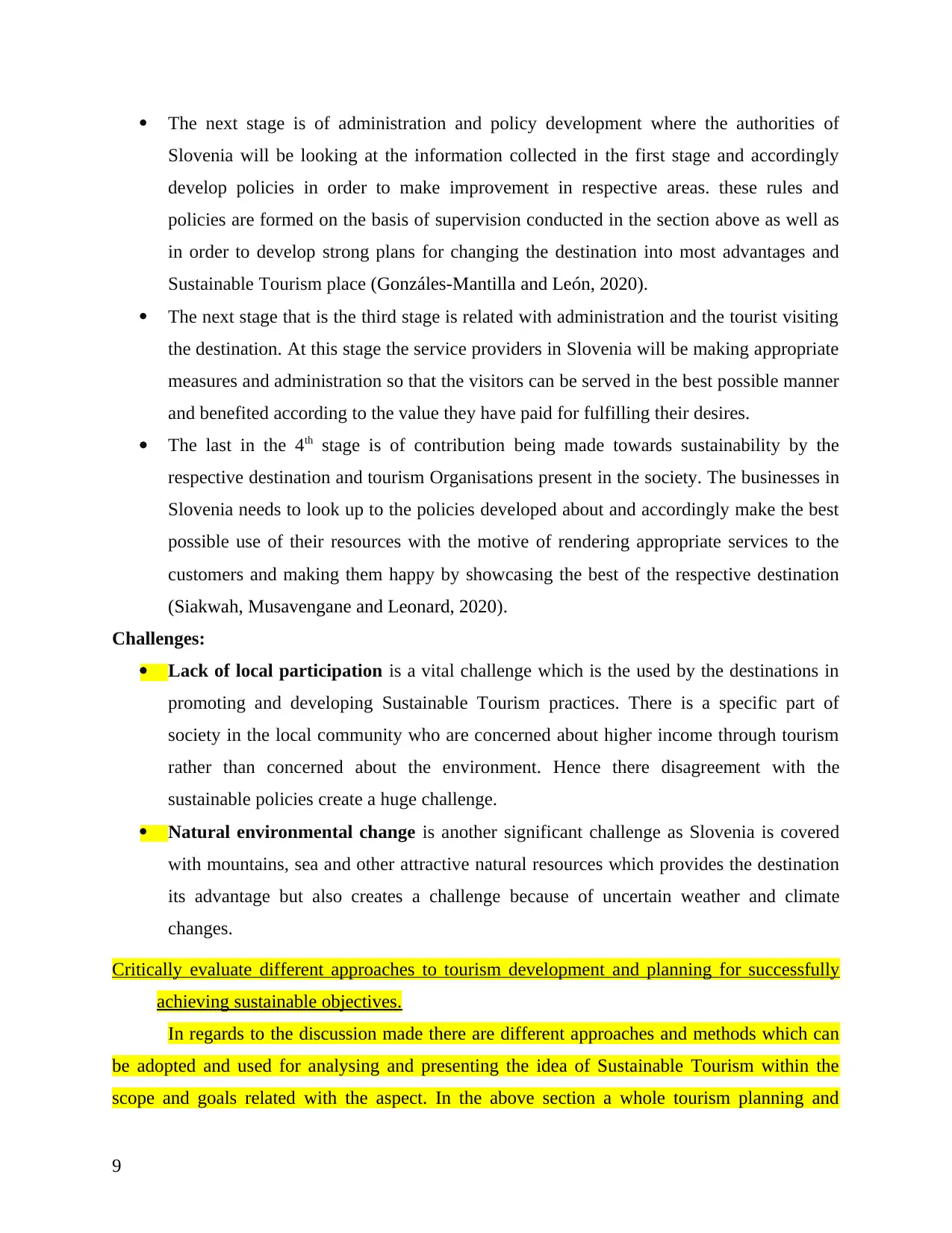
The next stage is of administration and policy development where the authorities of
Slovenia will be looking at the information collected in the first stage and accordingly
develop policies in order to make improvement in respective areas. these rules and
policies are formed on the basis of supervision conducted in the section above as well as
in order to develop strong plans for changing the destination into most advantages and
Sustainable Tourism place (Gonzáles-Mantilla and León, 2020).
The next stage that is the third stage is related with administration and the tourist visiting
the destination. At this stage the service providers in Slovenia will be making appropriate
measures and administration so that the visitors can be served in the best possible manner
and benefited according to the value they have paid for fulfilling their desires.
The last in the 4th stage is of contribution being made towards sustainability by the
respective destination and tourism Organisations present in the society. The businesses in
Slovenia needs to look up to the policies developed about and accordingly make the best
possible use of their resources with the motive of rendering appropriate services to the
customers and making them happy by showcasing the best of the respective destination
(Siakwah, Musavengane and Leonard, 2020).
Challenges:
Lack of local participation is a vital challenge which is the used by the destinations in
promoting and developing Sustainable Tourism practices. There is a specific part of
society in the local community who are concerned about higher income through tourism
rather than concerned about the environment. Hence there disagreement with the
sustainable policies create a huge challenge.
Natural environmental change is another significant challenge as Slovenia is covered
with mountains, sea and other attractive natural resources which provides the destination
its advantage but also creates a challenge because of uncertain weather and climate
changes.
Critically evaluate different approaches to tourism development and planning for successfully
achieving sustainable objectives.
In regards to the discussion made there are different approaches and methods which can
be adopted and used for analysing and presenting the idea of Sustainable Tourism within the
scope and goals related with the aspect. In the above section a whole tourism planning and
9
Slovenia will be looking at the information collected in the first stage and accordingly
develop policies in order to make improvement in respective areas. these rules and
policies are formed on the basis of supervision conducted in the section above as well as
in order to develop strong plans for changing the destination into most advantages and
Sustainable Tourism place (Gonzáles-Mantilla and León, 2020).
The next stage that is the third stage is related with administration and the tourist visiting
the destination. At this stage the service providers in Slovenia will be making appropriate
measures and administration so that the visitors can be served in the best possible manner
and benefited according to the value they have paid for fulfilling their desires.
The last in the 4th stage is of contribution being made towards sustainability by the
respective destination and tourism Organisations present in the society. The businesses in
Slovenia needs to look up to the policies developed about and accordingly make the best
possible use of their resources with the motive of rendering appropriate services to the
customers and making them happy by showcasing the best of the respective destination
(Siakwah, Musavengane and Leonard, 2020).
Challenges:
Lack of local participation is a vital challenge which is the used by the destinations in
promoting and developing Sustainable Tourism practices. There is a specific part of
society in the local community who are concerned about higher income through tourism
rather than concerned about the environment. Hence there disagreement with the
sustainable policies create a huge challenge.
Natural environmental change is another significant challenge as Slovenia is covered
with mountains, sea and other attractive natural resources which provides the destination
its advantage but also creates a challenge because of uncertain weather and climate
changes.
Critically evaluate different approaches to tourism development and planning for successfully
achieving sustainable objectives.
In regards to the discussion made there are different approaches and methods which can
be adopted and used for analysing and presenting the idea of Sustainable Tourism within the
scope and goals related with the aspect. In the above section a whole tourism planning and
9
⊘ This is a preview!⊘
Do you want full access?
Subscribe today to unlock all pages.

Trusted by 1+ million students worldwide
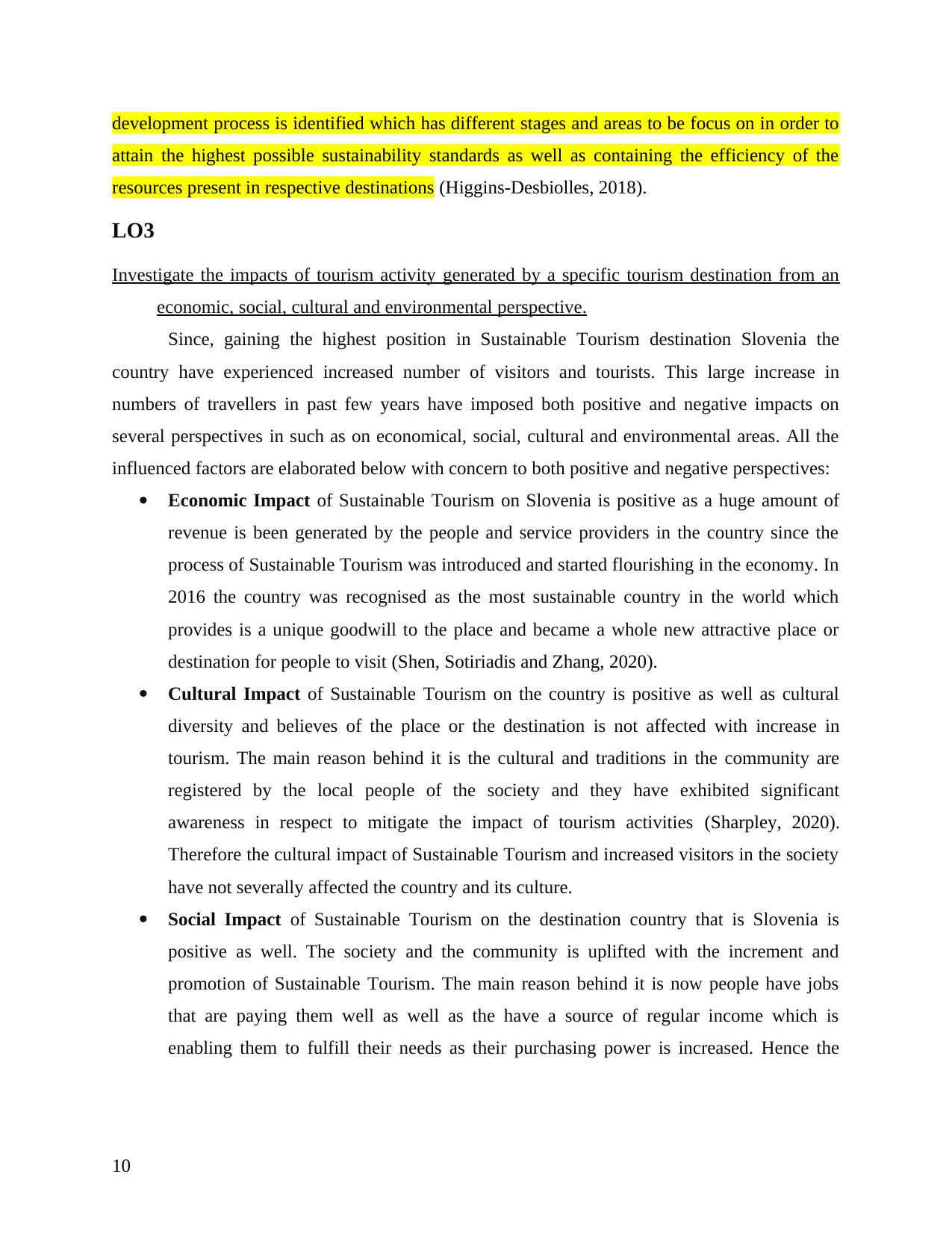
development process is identified which has different stages and areas to be focus on in order to
attain the highest possible sustainability standards as well as containing the efficiency of the
resources present in respective destinations (Higgins-Desbiolles, 2018).
LO3
Investigate the impacts of tourism activity generated by a specific tourism destination from an
economic, social, cultural and environmental perspective.
Since, gaining the highest position in Sustainable Tourism destination Slovenia the
country have experienced increased number of visitors and tourists. This large increase in
numbers of travellers in past few years have imposed both positive and negative impacts on
several perspectives in such as on economical, social, cultural and environmental areas. All the
influenced factors are elaborated below with concern to both positive and negative perspectives:
Economic Impact of Sustainable Tourism on Slovenia is positive as a huge amount of
revenue is been generated by the people and service providers in the country since the
process of Sustainable Tourism was introduced and started flourishing in the economy. In
2016 the country was recognised as the most sustainable country in the world which
provides is a unique goodwill to the place and became a whole new attractive place or
destination for people to visit (Shen, Sotiriadis and Zhang, 2020).
Cultural Impact of Sustainable Tourism on the country is positive as well as cultural
diversity and believes of the place or the destination is not affected with increase in
tourism. The main reason behind it is the cultural and traditions in the community are
registered by the local people of the society and they have exhibited significant
awareness in respect to mitigate the impact of tourism activities (Sharpley, 2020).
Therefore the cultural impact of Sustainable Tourism and increased visitors in the society
have not severally affected the country and its culture.
Social Impact of Sustainable Tourism on the destination country that is Slovenia is
positive as well. The society and the community is uplifted with the increment and
promotion of Sustainable Tourism. The main reason behind it is now people have jobs
that are paying them well as well as the have a source of regular income which is
enabling them to fulfill their needs as their purchasing power is increased. Hence the
10
attain the highest possible sustainability standards as well as containing the efficiency of the
resources present in respective destinations (Higgins-Desbiolles, 2018).
LO3
Investigate the impacts of tourism activity generated by a specific tourism destination from an
economic, social, cultural and environmental perspective.
Since, gaining the highest position in Sustainable Tourism destination Slovenia the
country have experienced increased number of visitors and tourists. This large increase in
numbers of travellers in past few years have imposed both positive and negative impacts on
several perspectives in such as on economical, social, cultural and environmental areas. All the
influenced factors are elaborated below with concern to both positive and negative perspectives:
Economic Impact of Sustainable Tourism on Slovenia is positive as a huge amount of
revenue is been generated by the people and service providers in the country since the
process of Sustainable Tourism was introduced and started flourishing in the economy. In
2016 the country was recognised as the most sustainable country in the world which
provides is a unique goodwill to the place and became a whole new attractive place or
destination for people to visit (Shen, Sotiriadis and Zhang, 2020).
Cultural Impact of Sustainable Tourism on the country is positive as well as cultural
diversity and believes of the place or the destination is not affected with increase in
tourism. The main reason behind it is the cultural and traditions in the community are
registered by the local people of the society and they have exhibited significant
awareness in respect to mitigate the impact of tourism activities (Sharpley, 2020).
Therefore the cultural impact of Sustainable Tourism and increased visitors in the society
have not severally affected the country and its culture.
Social Impact of Sustainable Tourism on the destination country that is Slovenia is
positive as well. The society and the community is uplifted with the increment and
promotion of Sustainable Tourism. The main reason behind it is now people have jobs
that are paying them well as well as the have a source of regular income which is
enabling them to fulfill their needs as their purchasing power is increased. Hence the
10
Paraphrase This Document
Need a fresh take? Get an instant paraphrase of this document with our AI Paraphraser
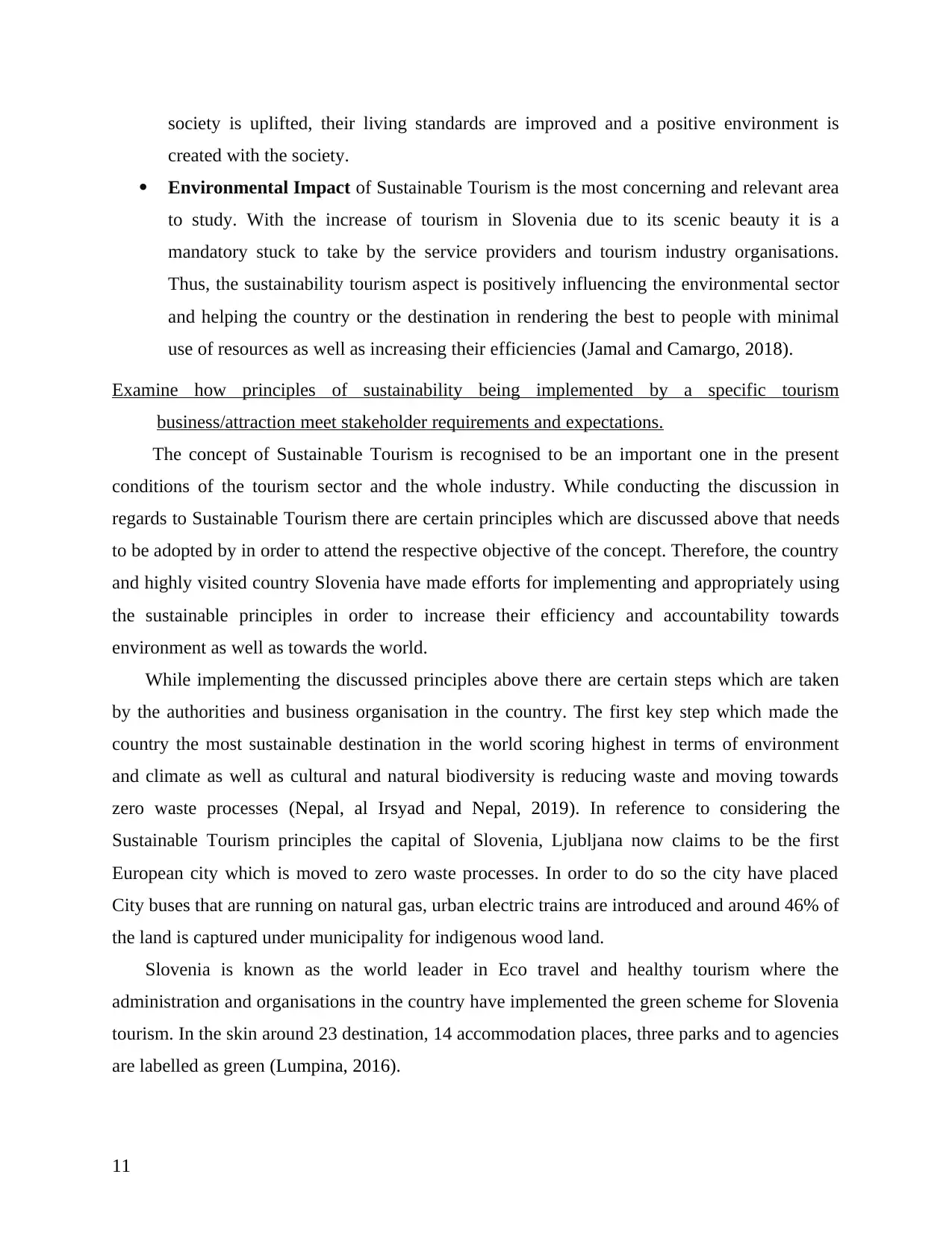
society is uplifted, their living standards are improved and a positive environment is
created with the society.
Environmental Impact of Sustainable Tourism is the most concerning and relevant area
to study. With the increase of tourism in Slovenia due to its scenic beauty it is a
mandatory stuck to take by the service providers and tourism industry organisations.
Thus, the sustainability tourism aspect is positively influencing the environmental sector
and helping the country or the destination in rendering the best to people with minimal
use of resources as well as increasing their efficiencies (Jamal and Camargo, 2018).
Examine how principles of sustainability being implemented by a specific tourism
business/attraction meet stakeholder requirements and expectations.
The concept of Sustainable Tourism is recognised to be an important one in the present
conditions of the tourism sector and the whole industry. While conducting the discussion in
regards to Sustainable Tourism there are certain principles which are discussed above that needs
to be adopted by in order to attend the respective objective of the concept. Therefore, the country
and highly visited country Slovenia have made efforts for implementing and appropriately using
the sustainable principles in order to increase their efficiency and accountability towards
environment as well as towards the world.
While implementing the discussed principles above there are certain steps which are taken
by the authorities and business organisation in the country. The first key step which made the
country the most sustainable destination in the world scoring highest in terms of environment
and climate as well as cultural and natural biodiversity is reducing waste and moving towards
zero waste processes (Nepal, al Irsyad and Nepal, 2019). In reference to considering the
Sustainable Tourism principles the capital of Slovenia, Ljubljana now claims to be the first
European city which is moved to zero waste processes. In order to do so the city have placed
City buses that are running on natural gas, urban electric trains are introduced and around 46% of
the land is captured under municipality for indigenous wood land.
Slovenia is known as the world leader in Eco travel and healthy tourism where the
administration and organisations in the country have implemented the green scheme for Slovenia
tourism. In the skin around 23 destination, 14 accommodation places, three parks and to agencies
are labelled as green (Lumpina, 2016).
11
created with the society.
Environmental Impact of Sustainable Tourism is the most concerning and relevant area
to study. With the increase of tourism in Slovenia due to its scenic beauty it is a
mandatory stuck to take by the service providers and tourism industry organisations.
Thus, the sustainability tourism aspect is positively influencing the environmental sector
and helping the country or the destination in rendering the best to people with minimal
use of resources as well as increasing their efficiencies (Jamal and Camargo, 2018).
Examine how principles of sustainability being implemented by a specific tourism
business/attraction meet stakeholder requirements and expectations.
The concept of Sustainable Tourism is recognised to be an important one in the present
conditions of the tourism sector and the whole industry. While conducting the discussion in
regards to Sustainable Tourism there are certain principles which are discussed above that needs
to be adopted by in order to attend the respective objective of the concept. Therefore, the country
and highly visited country Slovenia have made efforts for implementing and appropriately using
the sustainable principles in order to increase their efficiency and accountability towards
environment as well as towards the world.
While implementing the discussed principles above there are certain steps which are taken
by the authorities and business organisation in the country. The first key step which made the
country the most sustainable destination in the world scoring highest in terms of environment
and climate as well as cultural and natural biodiversity is reducing waste and moving towards
zero waste processes (Nepal, al Irsyad and Nepal, 2019). In reference to considering the
Sustainable Tourism principles the capital of Slovenia, Ljubljana now claims to be the first
European city which is moved to zero waste processes. In order to do so the city have placed
City buses that are running on natural gas, urban electric trains are introduced and around 46% of
the land is captured under municipality for indigenous wood land.
Slovenia is known as the world leader in Eco travel and healthy tourism where the
administration and organisations in the country have implemented the green scheme for Slovenia
tourism. In the skin around 23 destination, 14 accommodation places, three parks and to agencies
are labelled as green (Lumpina, 2016).
11
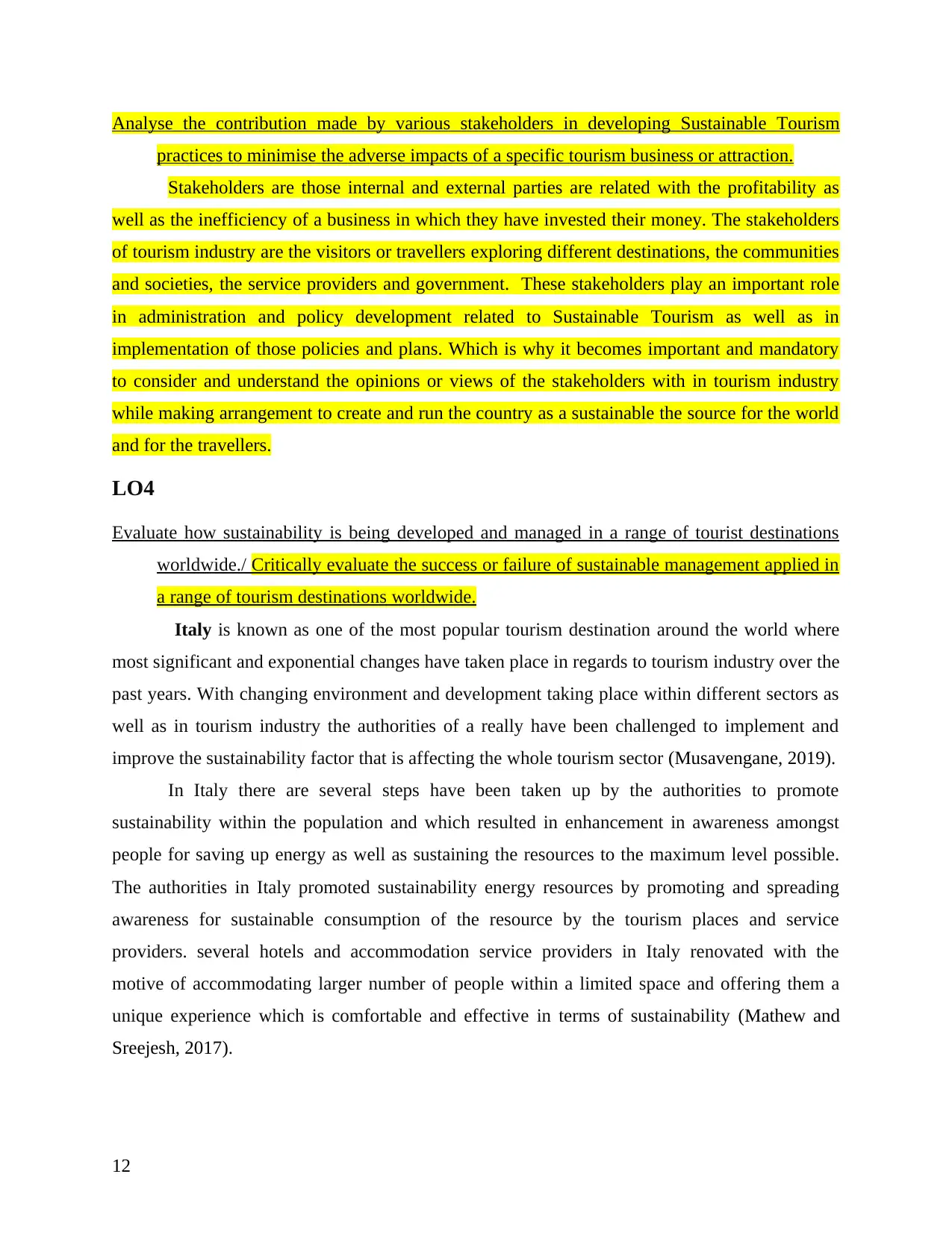
Analyse the contribution made by various stakeholders in developing Sustainable Tourism
practices to minimise the adverse impacts of a specific tourism business or attraction.
Stakeholders are those internal and external parties are related with the profitability as
well as the inefficiency of a business in which they have invested their money. The stakeholders
of tourism industry are the visitors or travellers exploring different destinations, the communities
and societies, the service providers and government. These stakeholders play an important role
in administration and policy development related to Sustainable Tourism as well as in
implementation of those policies and plans. Which is why it becomes important and mandatory
to consider and understand the opinions or views of the stakeholders with in tourism industry
while making arrangement to create and run the country as a sustainable the source for the world
and for the travellers.
LO4
Evaluate how sustainability is being developed and managed in a range of tourist destinations
worldwide./ Critically evaluate the success or failure of sustainable management applied in
a range of tourism destinations worldwide.
Italy is known as one of the most popular tourism destination around the world where
most significant and exponential changes have taken place in regards to tourism industry over the
past years. With changing environment and development taking place within different sectors as
well as in tourism industry the authorities of a really have been challenged to implement and
improve the sustainability factor that is affecting the whole tourism sector (Musavengane, 2019).
In Italy there are several steps have been taken up by the authorities to promote
sustainability within the population and which resulted in enhancement in awareness amongst
people for saving up energy as well as sustaining the resources to the maximum level possible.
The authorities in Italy promoted sustainability energy resources by promoting and spreading
awareness for sustainable consumption of the resource by the tourism places and service
providers. several hotels and accommodation service providers in Italy renovated with the
motive of accommodating larger number of people within a limited space and offering them a
unique experience which is comfortable and effective in terms of sustainability (Mathew and
Sreejesh, 2017).
12
practices to minimise the adverse impacts of a specific tourism business or attraction.
Stakeholders are those internal and external parties are related with the profitability as
well as the inefficiency of a business in which they have invested their money. The stakeholders
of tourism industry are the visitors or travellers exploring different destinations, the communities
and societies, the service providers and government. These stakeholders play an important role
in administration and policy development related to Sustainable Tourism as well as in
implementation of those policies and plans. Which is why it becomes important and mandatory
to consider and understand the opinions or views of the stakeholders with in tourism industry
while making arrangement to create and run the country as a sustainable the source for the world
and for the travellers.
LO4
Evaluate how sustainability is being developed and managed in a range of tourist destinations
worldwide./ Critically evaluate the success or failure of sustainable management applied in
a range of tourism destinations worldwide.
Italy is known as one of the most popular tourism destination around the world where
most significant and exponential changes have taken place in regards to tourism industry over the
past years. With changing environment and development taking place within different sectors as
well as in tourism industry the authorities of a really have been challenged to implement and
improve the sustainability factor that is affecting the whole tourism sector (Musavengane, 2019).
In Italy there are several steps have been taken up by the authorities to promote
sustainability within the population and which resulted in enhancement in awareness amongst
people for saving up energy as well as sustaining the resources to the maximum level possible.
The authorities in Italy promoted sustainability energy resources by promoting and spreading
awareness for sustainable consumption of the resource by the tourism places and service
providers. several hotels and accommodation service providers in Italy renovated with the
motive of accommodating larger number of people within a limited space and offering them a
unique experience which is comfortable and effective in terms of sustainability (Mathew and
Sreejesh, 2017).
12
⊘ This is a preview!⊘
Do you want full access?
Subscribe today to unlock all pages.

Trusted by 1+ million students worldwide
1 out of 15
Related Documents
Your All-in-One AI-Powered Toolkit for Academic Success.
+13062052269
info@desklib.com
Available 24*7 on WhatsApp / Email
![[object Object]](/_next/static/media/star-bottom.7253800d.svg)
Unlock your academic potential
Copyright © 2020–2026 A2Z Services. All Rights Reserved. Developed and managed by ZUCOL.





